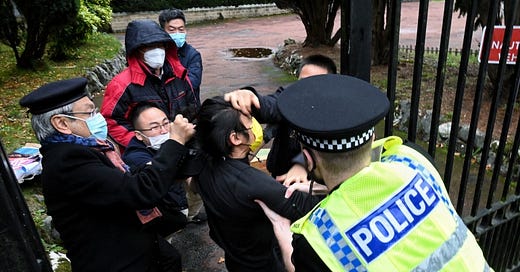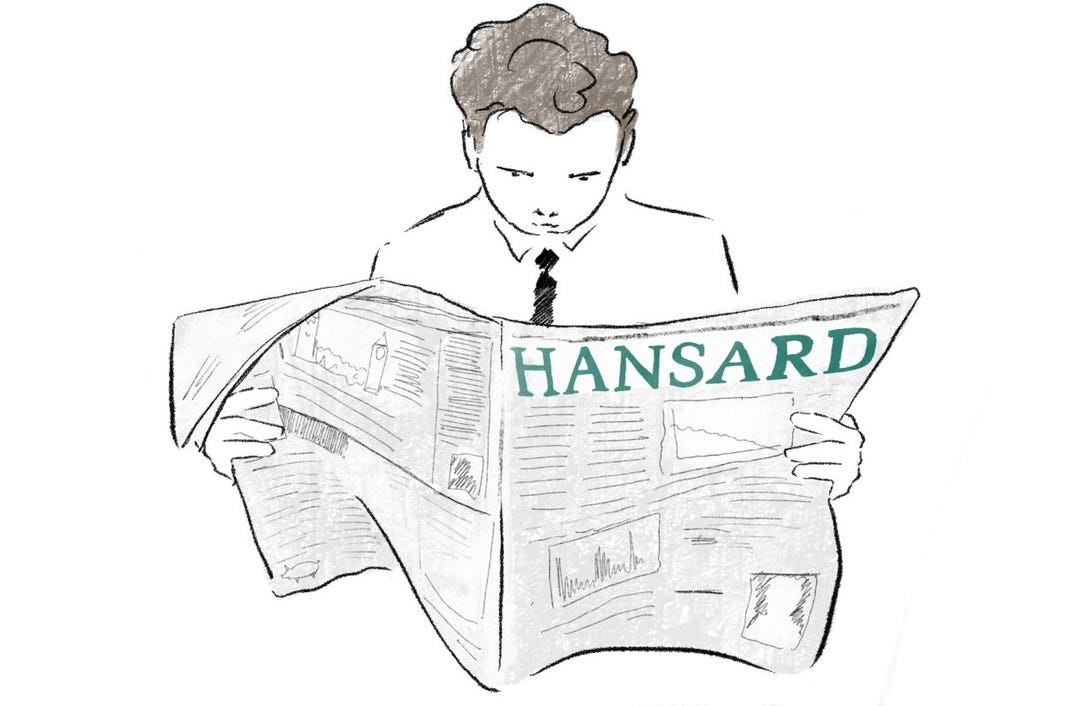Chinese diplomat scandal, Spy Bill and registering political interference, RAF pilots and China
A Beijing to Britain briefing
A quick note from the Editor.
This week marked two years of Beijing to Britain. I think this project has roughly existed through three eras of UK-China relations. The first was the end of the Golden Era, which spluttered to an close in roughly 2020. The second was what I term the ‘Alarm Era’ - where British politicians, activists and the media took a hard look at the commercial relationship between the two countries, and, incensed by issues such as Hong Kong, Huawei, Covid-19, Xinjiang, Tibet and Taiwan, tried to force the Government to act. The third Era, which I think we’re currently in, is what I will call the “Shaping Era.” The alarm has been raised, significant legislation is passing through Parliament aimed at shoring up national security, and no MP is going to stand up in the Commons and make the case for the UK as a natural Belt and Road Initiative partner. The low-hanging, ‘easy’ decisions have largely been considered. The hallmark of our current era is that it involves significant strategic considerations about what we want the next decades of UK-China relations to actually look like. What are the strategic red lines? The concessions? What pathway do we try and create to bring China back into the fold? What issues - such as AI standards or pandemic prevention - are not being given enough proper long-term analysis? Who should our partners be, and how can we work properly on existential threats? These are just a handful of the questions that will underpin this Era.
I plan to be here documenting and analysing it all, for you. This is my full-time job(!) so please consider supporting Beijing to Britain by becoming a paid subscriber.
Sam
Hello,
By this time next week, Britain will have another Prime Minister. Incumbent Liz Truss lasted 44 days - the shortest time in office in British history - and as this Briefing went to publication, it seemed her replacement will be either Rishi Sunak or Boris Johnson. At this stage there’s little to add, except that this is both a positive and negative reflection on democracy: a bloodless transition of power after a leader lost the mandate of their party and people, but at the temporary cost of strategic stability and limiting political bandwidth to act on pressing issues.
More critically for the moment, stories of spies and rogue military intelligence decorated the front pages of Britain’s papers this week. Some of it reads like a James Bond novel - such as the RAF pilots who, in retirement, have allegedly gone on to train the Chinese PLA (which the Ministry of Defence seems to have known about). Other parts are more technical - like the trouble brewing on the horizon for Britain’s lobbying and advisory sector. They should be deeply concerned about the Government’s new Foreign Influence Registration Scheme (FIRS), which it introduced this week. In short, it will force those companies and individuals acting for a foreign power or entity to declare political influencing activity – and criminalise those who do not. It is a scheme aimed squarely at “strengthen[ing] the resilience of the UK political system against covert foreign influence and provid[ing] greater assurance around the activities of specified foreign powers or entities.” And as readers may recall, the remit for who can be at the receiving end of political influence - defined in the Bill as the “purpose of influencing a matter or person” - is expansive. Details later in the Briefing.
Elsewhere, a diplomatic crisis triggered last Sunday has gathered momentum throughout the week, culminating in calls to expel Chinese diplomatic staff and a Sky News interview from China’s Consul General in Manchester. We unpack the anatomy of the scandal, with insider information, and take you through the week as events unfolded.
In the City, we’re pleased to be partnering with the British Chamber of Commerce in China to give paid readers free attendance at their 'China Now 2022' webinar, inviting experts to disseminate the outcomes of the Congress. Speakers include:
Stephen McDonald, BBC China correspondent
David Rennie, Beijing Bureau Chief of The Economist
Ruby Osman - Senior Researcher at the Tony Blair Institute for Change
Details further down the Briefing.
Order! Order!
Some of the more eye-catching questions and tweets from Westminster dwellers this week
Patricia Gibson (Shadow SNP Spokesperson (Housing, Communities and Local Government) asked “the Secretary of State for Foreign, Commonwealth and Development Affairs, what discussions he has had with Cabinet colleagues on allegations that the Chinese Government is operating unofficial police stations in London to track down dissidents and force them to return to China.”
Catherine West (Shadow Labour Minister for Asia and the Pacific) asked “the Secretary of State for Foreign, Commonwealth and Development Affairs, what discussions he has had with (a) the Secretary of State for Education (b) the higher education sector on (i) academic integrity (ii) the influence of Chinese state-owned enterprises and (iii) the influence of the Chinese Government in the sector.”





